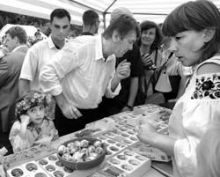Last year this festival, held on the initiative of Oleh Skrypka, the front man of the legendary pop group Vopli Vidopliasova, was not just an unforgettable event in the cultural and artistic life of Ukraine: it was, above all, the manifestation of spiritual liberation that triggered an orange extravaganza on the Maidan a few months later. Like last year, the weekend began with a “live street” that led to the hub of the events. There were all kinds of everything there! Books by contemporary Ukrainian authors, cassettes and discs of Ukrainian performers, even potted rose mallows, as well as never-ending live “master classes” in pottery, weaving, and woodcarving. Children could play on a special playground set up on the Field of Songs. The show organizer Iryna Zapolska devised activities for the children of different age groups: the oldest ones painted the flower tree, an ancient Ukrainian archetype, the younger ones were gluing paper houses and then painted windows and doors on them, while the tiny tots were making traditional paper- clip ornaments.
Various participants simultaneously performed on eight stages in all the three days of the festival. For example, the kobzars’ stage featured the performers who are an indispensable part of vechornytsi (informal evening gatherings) and, in the long run, the “Dream Country.” Among them were Taras Sylenko, Mykhailo Tovkailo, Yurko Fedynsky, and Taras Kompanychenko. What became a real gem of the feast was ashig (folk musician) Mustafa from Turkey, who played 14th-20th-century Turkish songs on bahlama, a drum-shaped instrument resembling the Ukrainian archetypal kobza. Of great interest were the regional folklore groups Serpanok from Sumy, Kyrym from the Crimea, Dyke Pole from Kirovohrad, and Vesilni Muzyky from Odesa oblast. Each of them presented the musical culture of their area. “The folklore music is a live one: it is born in a natural way, i.e., out of feelings and worries, in other words, from the bottom of a heart,” says Foma from the Mandry group about his impressions.
More and more people would come over on all the three festival days, especially in the evening. Some of them are permanent participants in vechornytsi and “streets,” others were here last year, but the majority came to know about the “Dream Country,” naturally, from their friends and television adverts. What also played a major role was the prestige of Oleh Skrypka himself. In fact, this festival has become a great attraction in just one year.
“I want to create a vogue for folklore in Ukraine,” Oleh Skrypka told The Day. “Modern music based on ethnic traditions is now arousing great interest all over Europe, and folklore festivals are considered extraordinary musical events. All the more so that it is a very old Ukrainian tradition.”
The “Dream Country” is thus continuing to establish — non- aggressively — a vogue for stylish, attractive and multifaceted things Ukrainian. The organizers promise that next year admission will be free only for those wearing the national costume, while others will be charged a nominal fee of, say, five hryvnias.







